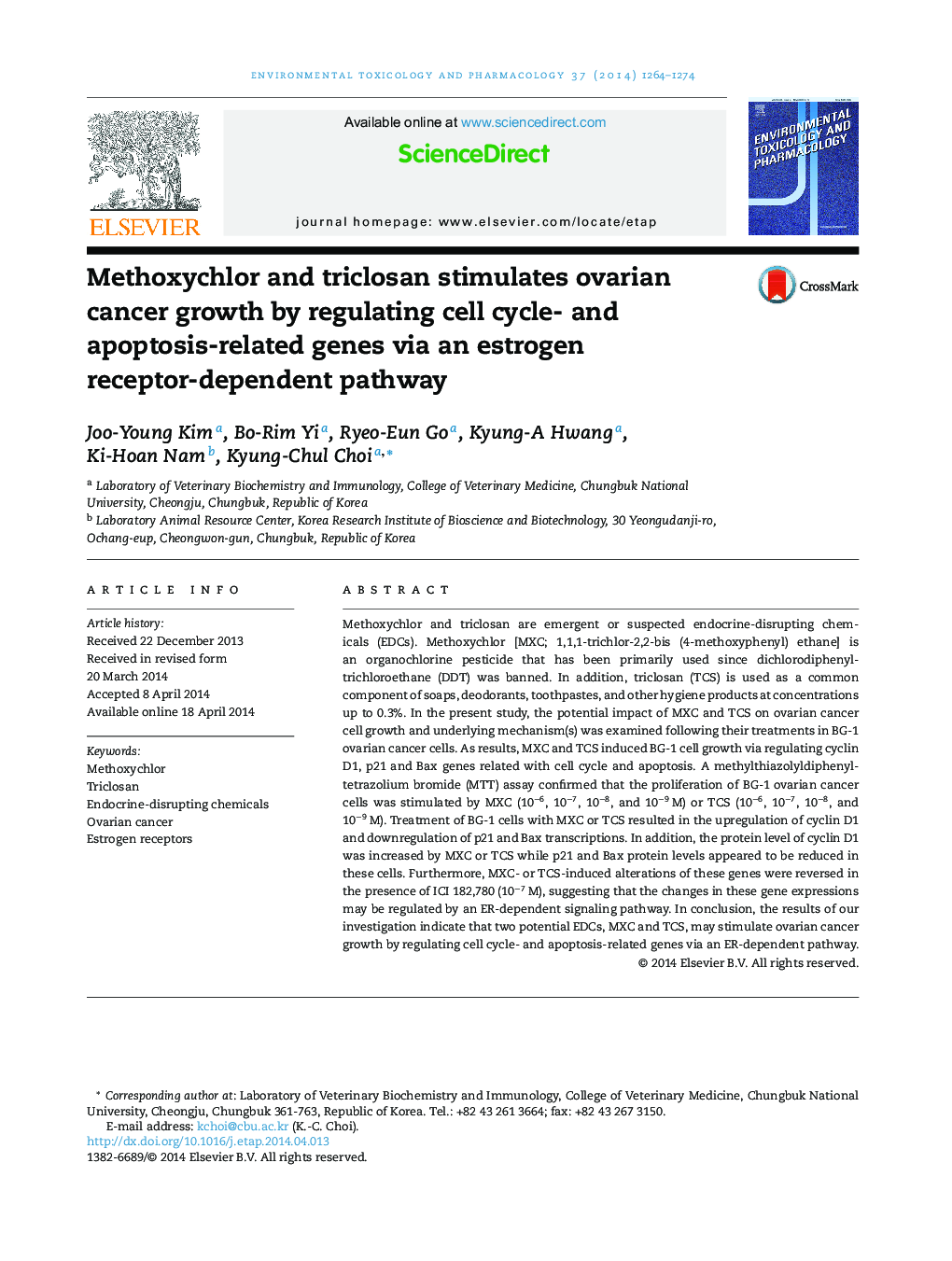| کد مقاله | کد نشریه | سال انتشار | مقاله انگلیسی | نسخه تمام متن |
|---|---|---|---|---|
| 5849167 | 1130706 | 2014 | 11 صفحه PDF | دانلود رایگان |
عنوان انگلیسی مقاله ISI
Methoxychlor and triclosan stimulates ovarian cancer growth by regulating cell cycle- and apoptosis-related genes via an estrogen receptor-dependent pathway
ترجمه فارسی عنوان
متوکسی کلور و تریکلوسان باعث افزایش رشد سرطان تخمدان با تنظیم ژن های مربوط به چرخه سلول و آپوپتوز از طریق یک راه وابسته به گیرنده استروژن
دانلود مقاله + سفارش ترجمه
دانلود مقاله ISI انگلیسی
رایگان برای ایرانیان
کلمات کلیدی
متیو سایکلر، تریکلوزان، مواد شیمیایی خراب کننده غدد درون ریز، سرطان تخمدان، گیرنده های استروژن،
موضوعات مرتبط
علوم زیستی و بیوفناوری
علوم محیط زیست
بهداشت، سم شناسی و جهش زایی
چکیده انگلیسی
Methoxychlor and triclosan are emergent or suspected endocrine-disrupting chemicals (EDCs). Methoxychlor [MXC; 1,1,1-trichlor-2,2-bis (4-methoxyphenyl) ethane] is an organochlorine pesticide that has been primarily used since dichlorodiphenyltrichloroethane (DDT) was banned. In addition, triclosan (TCS) is used as a common component of soaps, deodorants, toothpastes, and other hygiene products at concentrations up to 0.3%. In the present study, the potential impact of MXC and TCS on ovarian cancer cell growth and underlying mechanism(s) was examined following their treatments in BG-1 ovarian cancer cells. As results, MXC and TCS induced BG-1 cell growth via regulating cyclin D1, p21 and Bax genes related with cell cycle and apoptosis. A methylthiazolyldiphenyl-tetrazolium bromide (MTT) assay confirmed that the proliferation of BG-1 ovarian cancer cells was stimulated by MXC (10â6, 10â7, 10â8, and 10â9Â M) or TCS (10â6, 10â7, 10â8, and 10â9Â M). Treatment of BG-1 cells with MXC or TCS resulted in the upregulation of cyclin D1 and downregulation of p21 and Bax transcriptions. In addition, the protein level of cyclin D1 was increased by MXC or TCS while p21 and Bax protein levels appeared to be reduced in these cells. Furthermore, MXC- or TCS-induced alterations of these genes were reversed in the presence of ICI 182,780 (10â7Â M), suggesting that the changes in these gene expressions may be regulated by an ER-dependent signaling pathway. In conclusion, the results of our investigation indicate that two potential EDCs, MXC and TCS, may stimulate ovarian cancer growth by regulating cell cycle- and apoptosis-related genes via an ER-dependent pathway.
ناشر
Database: Elsevier - ScienceDirect (ساینس دایرکت)
Journal: Environmental Toxicology and Pharmacology - Volume 37, Issue 3, May 2014, Pages 1264-1274
Journal: Environmental Toxicology and Pharmacology - Volume 37, Issue 3, May 2014, Pages 1264-1274
نویسندگان
Joo-Young Kim, Bo-Rim Yi, Ryeo-Eun Go, Kyung-A Hwang, Ki-Hoan Nam, Kyung-Chul Choi,
